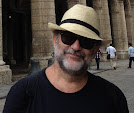Niño Josele, the young Gitano guitarist, is playing Bill Evans music at the Village Vanguard this week — that pianist’s own compositions, as well as songs by others that Evans brushed up against at various points between the 1950s and the 1970s. But because Niño Josele (born Juan José Heredia) is a flamenco musician with only a recent interest in jazz, the tunes were redesigned to suit his strength and temperament. The best parts of the set weren’t much like flamenco, and they weren’t much like jazz either. And this was very good.
In the first two sets of the week, on Tuesday, he and his trio were getting the kinks out, still addressing rough patches in sound and pacing. (There’s a danger of romantic ballad overload here, which the group barely skirted.) Together the musicians worked through close-to-the-ground grooves and slow rhythmic buildups, and Niño Josele applied what he knew, troweling on the flamenco ornamentation on each chord after he landed on it.
But he performed very little jazz-style improvising through the chord changes of the songs, and it may seem odd that a Spanish musician untrained in jazz would go straight to Bill Evans, one of the music’s heroes for soloing through changes. It didn’t much matter. The gig, and the record it draws from — “Paz” (Calle 54/Sony BMG) — are a good enough reason to get Niño Josele here and interacting with our musicians.
Flamenco doesn’t neatly superimpose over jazz, and Niño Josele isn’t meeting Evans completely on Evans’s terms. (He’s not drawing out the Andalusian-ness in these songs, either, because there’s none to speak of.) But “Paz” reflects a larger and more important desire: Niño Josele’s desire to expand the setting for what he does.
He began both sets on Tuesday with solo guitar pieces, drawing from Evans’s Satie-like “Peace Piece,” Luiz Eça’s “Dolphin” and the standard “My Foolish Heart”; they were all pretty ballads, and he trawled through them for emotional resonance, savoring the chords with his fingers.
But then the American-born bassist Esperanza Spalding and the Cuban-born drummer Horacio (El Negro) Hernandez came onstage, and suddenly we were hearing a take on the Steve Swallow song “Hullo Bolinas.” As the song picked up, it shifted into a strong, low-volume groove, with strummed guitar, bowed bass, brushed drums. This was now some mutant strain of folk music, played by excellent musicians coming from three different temperaments. It didn’t sound like anything normally heard at the Village Vanguard — except maybe 30 years ago, in the days of hippie-jazz syncretism, when people like Gabor Szabo were on the scene — but it made you want more, quickly.
There was a slightly unfocused version of Paul Simon’s “I Do It for Your Love,” which Evans covered toward the end of his life; Ms. Spalding, who is also a singer, put her light voice to it. But then the good, strange stuff struck again, in a version of Evans’s “Turn Out the Stars.”
The snare drum carried a reference to the bulería rhythm of flamenco, with Mr. Hernandez intimating the same chattering patterns, and the group came alive: each musician demonstrated a wicked gift. Ms. Spalding played a melodic solo on the bass that made it seem like an extension of her voice; Mr. Hernandez intensified and got rougher, making the groove more acute.
And though Niño Josele had been playing warily through the evening, perhaps out of deference to the aura of sensitivity that surrounds Bill Evans’s music like a barbed-wire fence, here he started to broach the intemperate gestures of flamenco guitar playing, the hammer-blow chords and fast flourishes, and his wary expression turned into a hungry smile.
BEN RATLIFF
Niño Josele continues through Sunday at the Village Vanguard, 178 Seventh Avenue South, at 11th Street, West Village; (212) 255-4037
(Publicado en New York Times 24/05/2007)
Los tenistas también lloran. Nadal/Federer
Hace 9 años


No hay comentarios:
Publicar un comentario